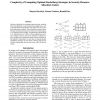277 search results - page 25 / 56 » A Model for Multiple Outcomes Games |
ISIPTA
2005
IEEE
14 years 2 months ago
2005
IEEE
: A generalization of subjective expected utility is presented in which the primitives are a finite set of states of the world, a finite set of strategies available to the decision...
CORR
2010
Springer
13 years 8 months ago
2010
Springer
We study a problem where wireless service providers compete for heterogenous and atomic (non-infinitesimal) wireless users. The users differ in their utility functions as well as ...
AAAI
2010
13 years 10 months ago
2010
Recently, algorithms for computing game-theoretic solutions have been deployed in real-world security applications, such as the placement of checkpoints and canine units at Los An...
COR
2008
13 years 8 months ago
2008
Investment in landscapes to achieve outcomes that have multiple environmental benefits has become a major priority in many countries. This gives rise to opportunities for mathemat...
JMLR
2008
13 years 8 months ago
2008
This paper presents the dynamics of multiple learning agents from an evolutionary game theoretic perspective. We provide replicator dynamics models for cooperative coevolutionary ...

